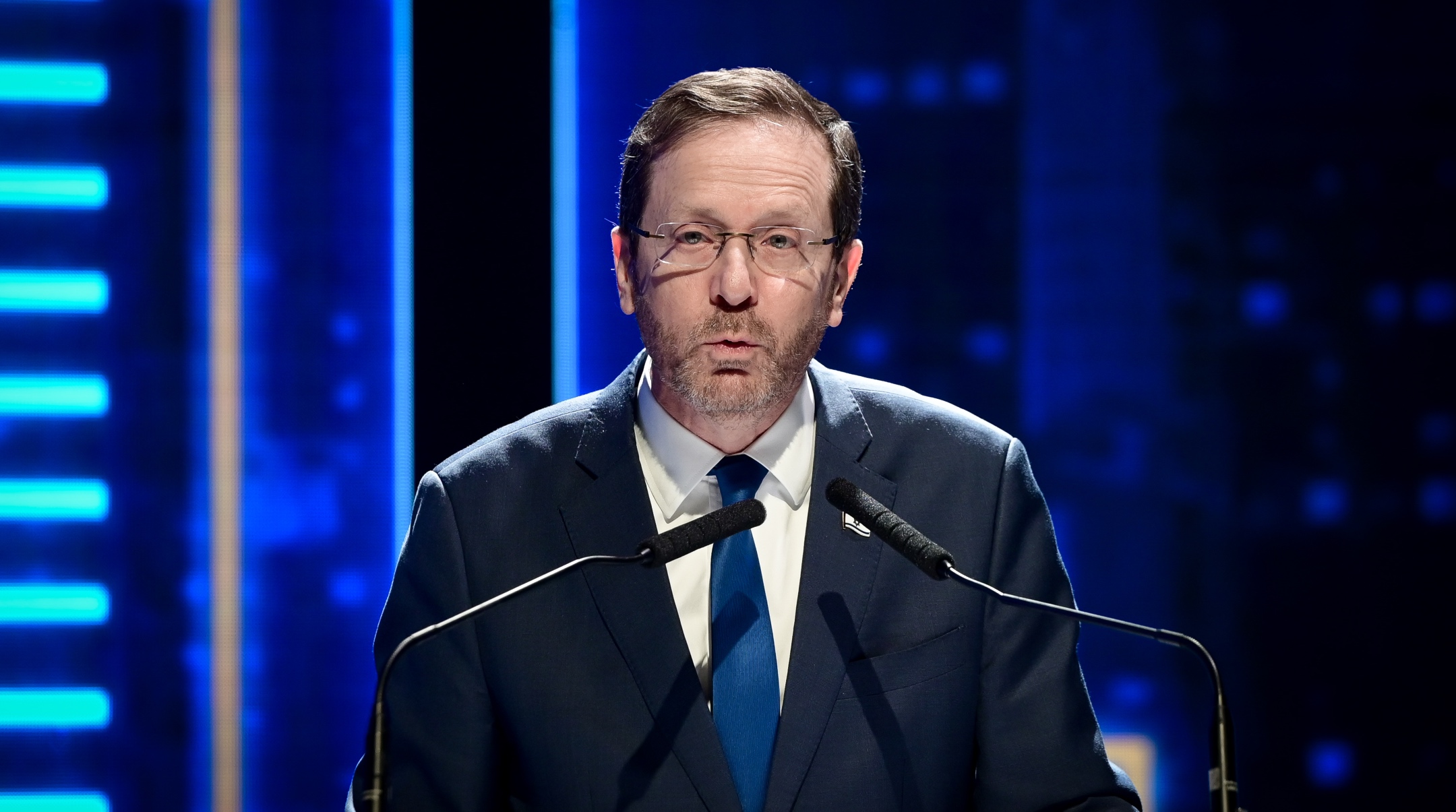Israeli President Isaac Herzog warns of a looming, bloody ‘real civil war’
‘The abyss is within reach,’ Herzog said

Israeli President Isaac Herzog attends a Honorary Citizenship Ceremony in Tel Aviv, March 13, 2023.(Avshalom Sassoni/Flash90)
(JTA) — Israeli President Isaac Herzog warned of the possibility of civil war if the government won’t agree to a compromise on judicial reform, a stunning pronouncement from a personality and an office that are both known for restraint.
“I have heard real, deep hatred,” Herzog said in an address carried on primetime TV. “I have heard people, from all sides saying that God forbid, blood in the streets will not shock them.”
Herzog, whose compromise proposals were already being rejected by the government, said his warning should terrify every Israeli.
“He who thinks that a real civil war, one that costs lives, is a line we won’t reach, is out of touch,” he said. “In this moment, of all moments, in the 75th year of the state of Israel, the abyss is within reach.”
The speech, as chilling as it was, did not appear likely to head off the intensifying unrest. The opposition welcomed Herzog’s proposed compromise, while government figures rejected them.
Israel has been rocked by weeks of protests against reforms proposed by Israeli Prime Minister Benjamin Netanyahu, which would sap the judiciary of its independence. More recently, the national security minister, Itamar Ben-Gvir — a follower of Meir Kahane, a rabbi barred from Israel’s parliament in the 1980s because of his racism — has ordered police crackdowns on protesters.
The speech was extraordinary in part because the role of president is mostly ceremonial. The president is seen as a conciliator in Israel’s fractious society.
Additionally, Herzog, a past leader of the Israeli Labor party and a chairman of the Jewish Agency, is seen as a compromiser. In 2021, when the 120 Knesset members elected him in a secret ballot, he won a larger majority, 87, than any of his predecessors, drawing support from the left and the right.
The courts have repeatedly defended the rights of vulnerable populations in Israel, including Arab Israelis, LGBTQ people, non-Orthodox Jews and women. Netanyahu’s supporters say the proposed changes put necessary brakes on an activist judiciary, while critics at home and abroad — including President Joe Biden, top Senate Democrats and portions of the Jewish organizational establishment in the United States — say they threaten Israel’s democracy.
With his speech, Herzog unveiled a proposed compromise, which would balance judicial and political interests in selecting judges. Proponents of reform say the system now allows judges too much power in choosing their replacements, and want to give the upper hand to the ruling coalition.
Herzog’s compromises also include advancing a law that would make it harder to pass the “basic laws” that comprise Israel’s constitution. Basic laws currently require an absolute majority of 61 of 120 members to pass. Herzog’s proposal would preserve the 61 threshold for each of the first three votes, but would also add a fourth and final reading requiring a two-thirds majority of 80 Knesset members.
His compromise would also reduce the power of the Supreme Court to review laws the Knesset passes, but would not go as far as Netanyahu’s proposals to gut judicial review. Under Herzog’s system, for instance, the court would not review basic laws. The fact that such laws would need 80 votes to pass would likely mitigate the court’s perceived need to review the laws.
Herzog also proposes a basic law to protect the rights of vulnerable populations.
Government figures immediately rejected Herzog’s proposal. “It’s worse than the current situation,” said Shlomo Karhi, the communications minister, on Twitter. “We can’t accept it.” Opposition leaders meanwhile welcomed the proposal and said it could serve as a basis for a negotiated compromise.
This article originally appeared on JTA.org.














